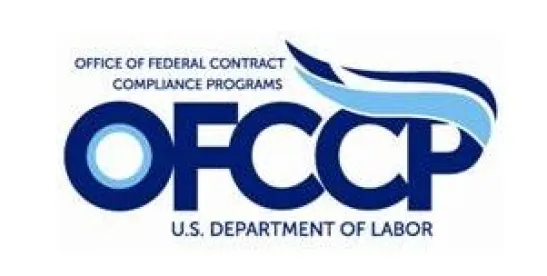The U.S. Department of Labor’s Office of Federal Contract Compliance Programs (OFCCP) recently released its new Construction Scheduling Letter and Itemized Listing for federal construction contractors subject to Executive Order 11246, Section 503, or the Vietnam Era Veterans’ Readjustment Assistance Act (VEVRAA). The letter—effective October 1, 2024—imposes significant additional requirements for federal construction contractors in terms of data collection and production and could apply to certain supply and service contractors that also do construction work.
Construction contractors undergoing compliance reviews after October 1, 2024, will be required to comply with expanded initial data and document requests contained in the revised letter. Contractors on a recent Corporate Scheduling Announcement List (CSAL)—a courtesy notification from OFCCP listing contractors selected for compliance evaluation—that have not yet been scheduled for compliance reviews may want to ensure they can produce the information requested.
Quick Hits
- The letter imposes additional data collection and retention obligations for certified payrolls, such as tracking overtime hours and rates, bonuses, and “other” pay.
- The letter requests a new type of employee transaction data (layoffs) and seeks all employee transaction data for a new category of employee (non-trade employees who supervise, inspect, or provide other on-site functions).
- OFCCP added two new requests to the Executive Order 11246 section requiring contractors to verify compliance with the Uniform Guidelines on Employee Selection Procedures (UGESP) for test and selection procedures and other personnel procedures.
The new letter, applicable to federal construction contractors (including federally assisted construction contractors), comes on the heels of OFCCP’s earlier revisions to the Supply and Service Scheduling Letter and Itemized Listing, issued on August 25, 2023. As we previously reported, OFCCP proposed changes to the Construction Scheduling Letter and Itemized Listing in February 2024 that included expanded obligations for construction contractors under compliance review.
In its supporting statement for the proposed changes to the Construction Scheduling Letter, OFCCP gave a number of justifications for the changes, including, among other things, promoting efficiency, aiding OFCCP’s ability to conduct robust statistical analyses, improving OFCCP’s ability to schedule on-site reviews, clarifying the scope of existing requests, and adding the same level of detail as was recently added by the agency to the Supply and Service Scheduling Letter. The letter increases the volume of data and information contractors must produce; it requires that contractors submit employment activity data in a readable electronic database, such as a spreadsheet software program; it includes a preference that affirmative action program (AAP) and itemized listing information be provided to OFCCP electronically; and it clarifies that OFCCP may initiate an enforcement action if the requested information is not received within thirty days of the contractor receiving the letter.
Additional Data Requests
While many changes to the VEVRAA and Section 503 sections of the letter involve clarifications regarding what to include in utilization analysis, union notifications, and assessment of outreach and personnel processes, the letter imposes significant additional obligations on contractors for Executive Order 11246. Specifically, the letter now requests additional “certified payroll” data beyond base wage, including overtime hours worked and a breakdown of regular pay rates, total regular pay, overtime pay rates, total overtime pay, and bonus or “other” pay. The new letter seemingly expands the scope of the employee population subject to audit by specifically requesting certified payroll data for non-trade personnel in supervisory, inspection, or “onsite functions incidental to the actual construction.” OFCCP has not clarified the scope of individuals covered by “onsite functions incidental to the actual construction,” and it is unclear whether the agency will consider this request to cover all personnel performing work on construction sites, even non-construction work.
In another notable change to employment transaction data obligations, the letter now requires contractors to produce data regarding layoffs. The expansion to non-trade personnel continues here, as the letter requests employment transaction data for non-trade personnel. The letter also requires contractors to provide specific dates for employment activity, such as dates for applications, hires, layoffs, promotions, and terminations. The new request for specific dates carries over to construction projects, as the letter now requires contractors to identify the start and anticipated end dates of every project performed in the relevant geographic area during the preceding twelve months.
New Requests
Besides seeking additional data, the letter includes two new itemized listing requests.
- First, in the new Item No.16, the letter now requires construction contractors to “[i]dentify all tests and selection procedures used in the hiring process,” including those that are “technology-based tests and selection procedures (e.g., artificial intelligence, algorithms, automated systems), as well as any other non-technology-based tests and selection procedures (e.g., written tests, work simulations, structured interview questions).” In addition to identifying all such tests, if adverse impact is found, contractors must provide evidence that the tests were “validated” under the UGESP. OFCCP made clear in its updated Construction Compliance Frequently Asked Questions (FAQs) that it expects a contractor’s response to Item No. 16 to include “information and documentation” for any “third-party recruiting, screening, and/or hiring products and services” the contractor employs. This new request mimics earlier revisions to the Supply and Service Scheduling Letter, which requests information on “policies, practices, or systems used to recruit, screen, and hire, including the use of artificial intelligence, algorithms, automated systems or other technology-based selection procedures.”
- Second, in the new Item No. 17, contractors must provide evidence that they “monitored personnel and employment related activities” to “ensure that seniority practices, job classifications, work assignments and other personnel practices did not have a discriminatory effect” (also per the UGESP). The updated FAQs suggest that a contractor may provide evidence that the contractor “monitored personnel and employment-related activities” by providing meeting notes, reports or notes describing the contractor’s review, or an impact-ratio analysis of the personnel practices.
The updated Construction Compliance FAQs expand on the agency’s interpretation of construction contractors’ obligations for the new letter and provide subregulatory guidance as contractors wade into this uncharted territory. Contractors may want to note that late last year OFCCP updated these FAQs to emphasize that the agency believes contracts meeting applicable contract thresholds must comply with both construction and supply and service contractor obligations. According to OFCCP’s subregulatory guidance, when a company has both construction and supply and service contracts, it must meet construction regulations for workers “engaged in on-site construction and functions incidental to the actual construction” and adhere to supply and service obligations at “every establishment (or functional/business unit, as applicable) where non-construction workers are located.”
The new Construction Scheduling Letter and Itemized Listing imposes additional burdens on construction contractors and will increase contractors’ production of data and information to OFCCP. Contractors subject to the letter will likely want to give careful thought to the new requests to ensure they are tracking the data necessary to respond within thirty days in the event of a compliance review.
In related news, on September 30, 2024, the Office of Management and Budget (OMB) gave final approval to a monthly data collection form for construction contractors. Stay tuned for more on this in our next article.
Next Steps
- OFCCP releases a courtesy notification to contractors chosen for compliance evaluation, which construction contractors may want to monitor.
- Given the increased compliance burden, contractors may want to determine whether they are subject to these construction compliance obligations and/or supply and service compliance obligations.
- Contractors may want to take steps now to ensure that current data tracking and payroll systems are compliant, especially given the short deadline for producing responsive items.
- Construction contractors may want to proactively (potentially, under attorney-client privilege) analyze personnel transactions and employee compensation to ensure that no impediments to equal employment opportunity exist.






 />i
/>i

